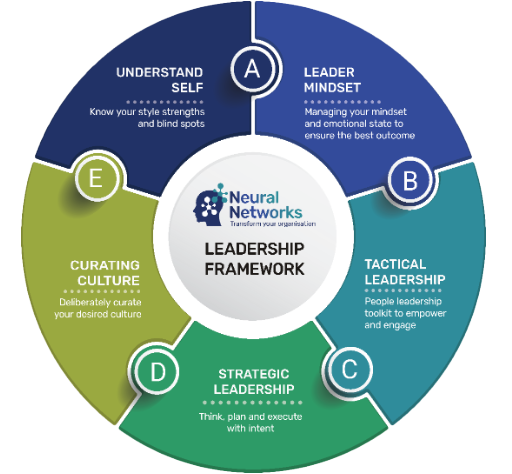What specific skills do your leadership programs cover?
Our leadership programs focus on developing the essential skills for effective leadership. We tailor each program to address specific learning outcomes, aligned with our Leadership Development Framework.

Key areas of focus include:
-
Understanding Self: Developing self-awareness and leadership style flexibility.
-
Leader Mindset: Managing emotional state and perspective-taking.
-
Tactical Leadership: Building relationships, providing feedback, and having difficult conversations.
-
Strategic Leadership: Applying leadership skills to organisational goals and change management.
-
Curating Culture: Fostering a positive and inclusive workplace culture.
By focusing on these areas, our programs equip participants with the tools they need to excel in their leadership roles.
What We Cover
Themes typically covered in each area are:
Understanding Self:
-
What it means to be a leader in the organisation
-
Leading with emotional intelligence
-
Building critical self-awareness & leadership style flexibility
-
How personal work values impact decisions, actions and behaviours
Leader Mindset:
-
Using Locus of Control as a situational leadership tool
-
Explore tools and techniques for self-managing emotions and behaviour in key moments
-
Emotional contagion and perspective-taking
Tactical Leadership:
-
Building rapport, trust and credibility with team members to grow interpersonal relationships
-
Build people leadership capability by being able to step into the perspective of your people, understand their motivations and preferred styles of communication
-
Help team members set emotionally compelling business and personal goals
-
Provide feedback in a way that engages team members in an open conversation
-
Have difficult (courageous) conversations on misaligned behaviours and/ or outcomes
-
Use values to create a cohesive and communicative team culture
-
Transformational coaching
-
Engage people with influential language according to their particular style
Strategic Leadership:
-
Application of leadership skills and emotional intelligence in context
-
Bringing organisational strategy to life
-
Relationship management and stakeholder influence
-
Leveraging change management approaches help people better engage with change
-
Applying positive accountability
Curating Culture:
-
What organisational culture (and subcultures) are and how they impact team dynamics, behaviour and organisational success
-
How to develop and use a narrative to create the desired team culture within your team/organisation
-
How psychological safety, diversity and inclusion contribute to team cohesion
-
The role emotion plays in culture, leadership and change
Sign up for the Neural Networks Newsletter
Join our mailing list to receive information on leadership, sales, and emotional intelligence.

 +61 9555 7955
+61 9555 7955